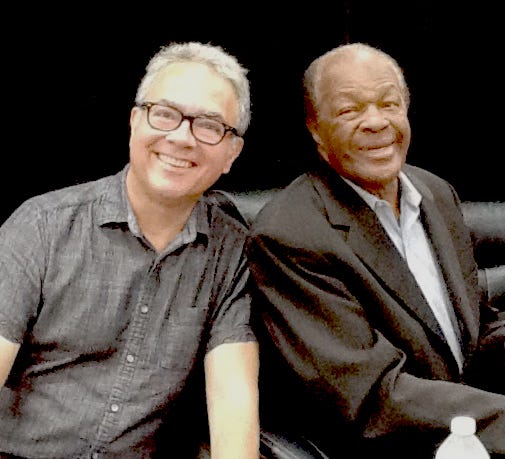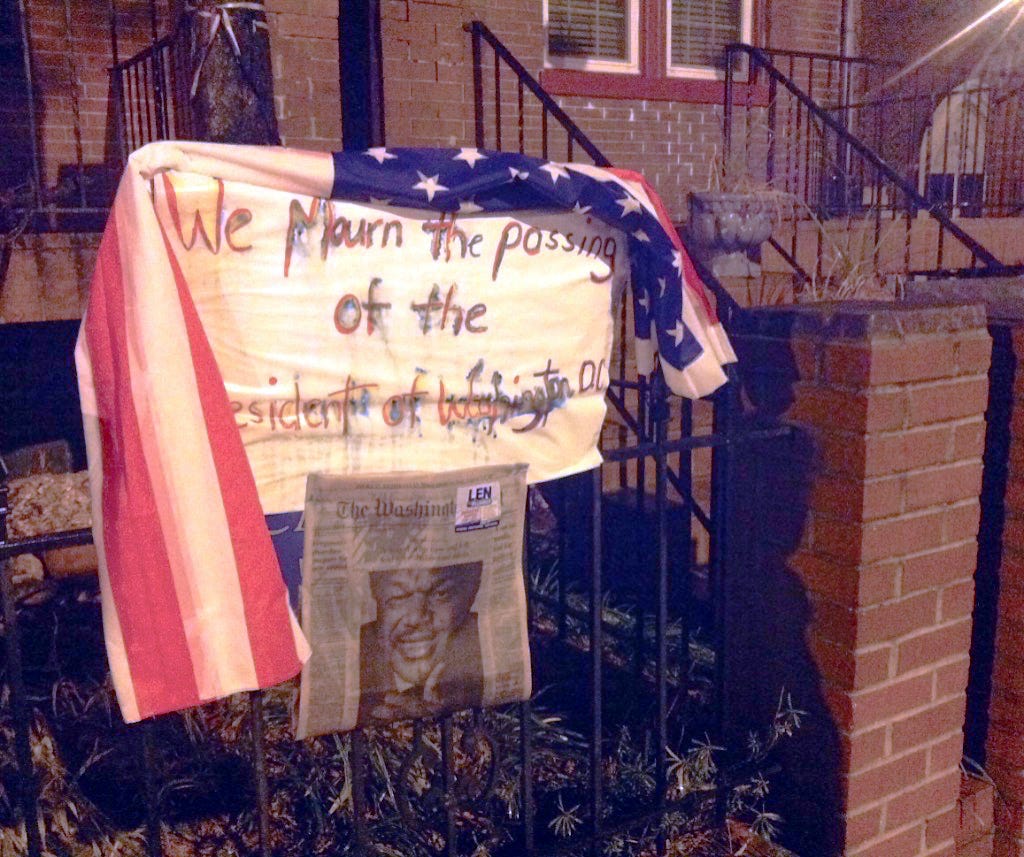 Photo of myself and Marion Barry taken by The Missus on August 30, 2014 at Costco.
Photo of myself and Marion Barry taken by The Missus on August 30, 2014 at Costco.
Here’s a blast from the past:
It was August 30, 2014, and Barry had just released his autobiography, Mayor for Life, which one had to buy a copy of at Costco to get a chance to meet and get an autograph from Barry. I don't usually take fan photos with celebrities, but when Marion Barry has a book signing, even at a megachain, you damn well go.
I don't have the book in front of me now -- if I find my (autographed!) copy sometime I'll quote some choice bits -- but the main thing I remember from it was how unapologetic it is, considering what a reputation (and a record) Barry had for behaviors outside the law and conventional morality. Not that the prose is defiant, really; in fact Barry does admit some personal wrongdoing, particularly in the family relations department; he never denies nor try to bull his way past what he's done.
But overall he has far fewer problems with his actions than his (mainly white) critics have had. In fact, to the extent that he bent or broke rules to provide advantages to DC's people of color, who had been historically disadvantaged by the local establishment, he was proud of himself. And his POV is justified by the experience of those he helped -- like Marcus K. Dowling, whose Medium essay “Marion Barry Could Be Anything in the Whole World” is well worth your time. Sample:
I saw Barry through from a perspective that’s disappearing from the city. Perilously few Washingtonians remain in the city who lived through his era of rule. But I did. Now that I’m nearing 40 years of age, and living life as a black man wanting to achieve a similar level of astounding excellence to Marion Barry, I have the context by which to judge and accept his legacy.
My experience is firsthand. He created legislation that got my elderly grandmother greater access to health care benefits and mother a job, during his first mayoral term, as an accountant in the DC Government’s Department of Finance and Revenue. As well, I had my first job, in the summer of 1992, as a 14-year old teenager, via Barry’s Summer Youth Employment Program.
Rinse, wash, and repeat this story thousands of times for grandparents, parents, and children across the city.
It is worth noting that there have actually been stories published in major outlets like "Something in Common: Oliver North, Marion Barry Flourish In Age of Balkanized Populism," written during Barry's heyday, and stories like "Trump Is The White Marion Barry," written after his death, by people who thought any comparison with Barry had to be unflattering, and should have known better and should also had been thrown off a fucking cliff with an anchor tied around their necks. (Metaphorically speaking, of course.)
In Mayor For Life Barry punctuates both good and bad events with a catchphrase I admire and have since come to adopt: "Sure I did.” It fits with his cadence of speech, and also with his habit of frank self-assessment. It’s his way of taking responsibility for what he's done, while also suggesting his opponents consider how they’d come out if someone had the bad taste to ask what they’d done with their lives.
The Northeast D.C. Costco ain't Politics and Prose -- nor Busboys and Poets, the black bougie joint you'd think would have a seat for Chocolate City's most distinguished African-American politician. But I think the Costco crowd suited Barry better; it was almost entirely black, and many of the folks in the line that snaked through the furniture department to the folding table where he sat told us how they loved the Mayor and how much he'd done for them or their family members.
When I got to the front of the line Barry took my volume and, without looking at me, asked if I lived in the District. I told him the wife and I lived near Hechinger Mall, in Northeast; as he signed, still uninterested in my gaze, he told me that he too had lived thereabouts for a while, well before it has gone through its "changes" -- his way of letting me know, I think, that it had been blackity-black then and someone like me would never have been seen there, back in the day. Being a “back in the day” sort myself, there was nothing I could say to that even if he had not been so politic in saying so.
I thanked him for his signature and introduced him to my wife, who snapped this cell-phone pic. Her presence seemed to thaw the Mayor, which may explain his relatively unforced grin in the picture, and the fact that he offered me his hand to shake afterwards. And I took it. Sure I did.
Barry died a few months later, and there were many shitty Marion Barry obituaries in papers and magazines. But I will always remember the way people in DC remembered him. The photo below shows one spontaneous display from my own neighborhood. It ain’t neat, but it’s heartfelt. I hope that, when we finally destroy the current, viciously rapacious version of capitalism that’s been killing us non-rich people, there’ll be some time in between guillotinings for tributes to people like Marion Barry.
UPDATE. Corrected several instances of “Marion Berry.” Maybe it’s time to hire an editor!




Speaking as one white guy who was entirely captive to the conventional assessment of Barry, thanks for the memory.
Thanks for this. I have memories of DC’s all-the-efficiency-of-a-Southern-city-and-all-the-charm-of-a-Northern-city days. My dad grew up in Capitol Hill during the Depression, and his grandfather worked at the Navy Yard when there was actual naval construction goin’ on. I had a friend who was in the MPD when H Street was emerging. I never thought I’s be nostalgic about DC, but that’s old age for you.